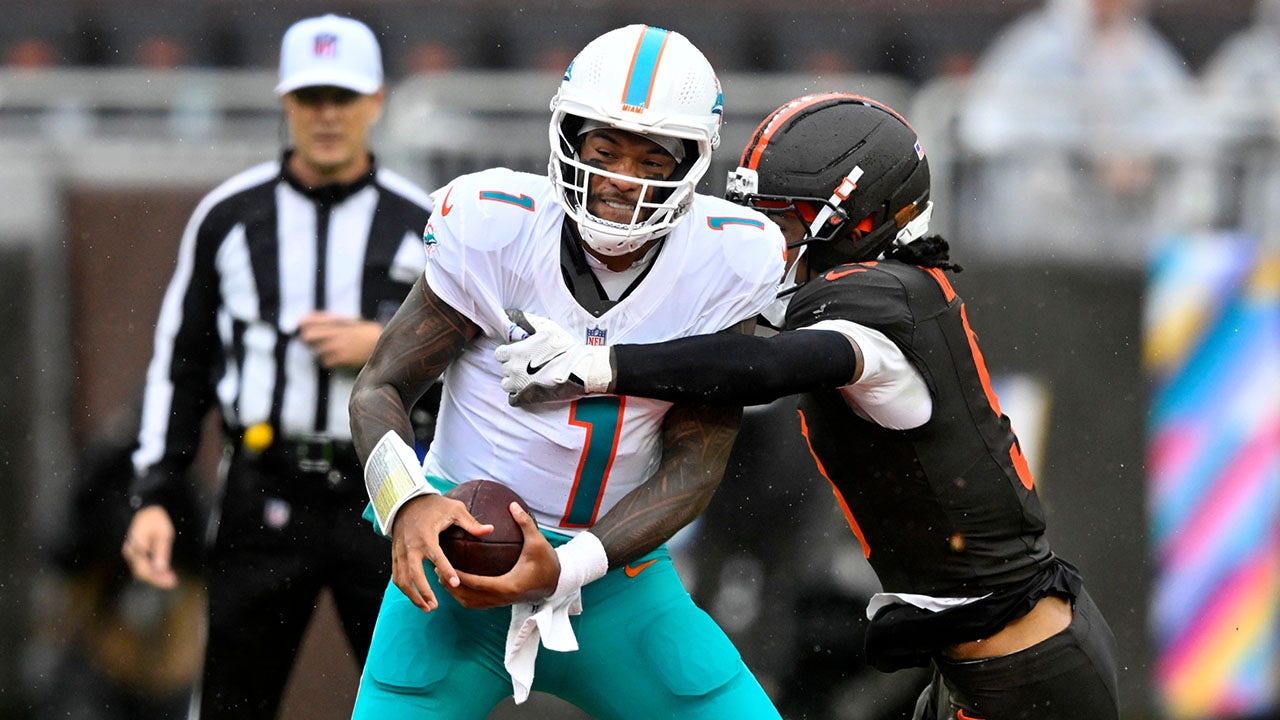The Miami Dolphins suffered a crushing 31-6 defeat on the road against the Cleveland Browns on Sunday, leaving fans and analysts alike concerned about the team’s current state of play. The loss, marked by a series of mistakes and underwhelming performances, has prompted sharp criticism from former NFL coach and Pro Football Hall of Famer Bill Cowher, who openly questioned the team’s effort and internal dynamics following the disappointing outing.
Miami’s struggles were evident throughout the game. Quarterback Tua Tagovailoa, who has been the focal point of the Dolphins’ offense, threw three interceptions as part of a total of four turnovers for the team. These costly errors severely hampered Miami’s ability to sustain drives and put points on the board. Beyond the turnovers, the team also committed 100 yards in penalties, compounding their difficulties and giving Cleveland additional opportunities to capitalize. The combination of turnovers and penalties created a recipe for disaster, ultimately reflected in the lopsided final score.
Speaking on CBS after the game, Bill Cowher did not mince words in his assessment of the Dolphins’ performance, especially in the second half. “They looked almost disinterested,” Cowher said bluntly. “They looked deflated. They looked almost … there was nothing left in the tank. They almost disengaged.” Cowher pointed out that while the defense allowed some big plays, it was the overall lack of energy and engagement on the field that was most striking. His comments hinted at deeper issues within the organization, noting the ongoing rumors about a lack of structure and internal turmoil in the Miami locker room and front office. “We don’t know what’s going on inside the building, because we’re not there. But we see the product that’s on the field. And right now, there’s some issues in Miami,” he added.
The Dolphins’ head coach Mike McDaniel acknowledged the team’s frustrations but emphasized the need to move forward constructively. In his postgame comments, McDaniel acknowledged that the players were visibly frustrated during the game, but warned against allowing that frustration to affect their execution on the field. “We can’t allow it to seep into our play and keep us from executing,” he said. McDaniel highlighted the critical nature of turnovers and penalties in determining the outcome of games, noting that “minus 4 (turnovers) and 100 yards in penalties, two formulas that generally will equal immediate loss, regardless of what you do.”
Despite the setback, McDaniel took responsibility for the team’s poor performance, emphasizing that accountability extends to all levels of the organization. “No person, no player, no coach has their hands clean and we have to get back to work, starting with me, do a better job,” he stated. The coach stressed the importance of evaluating all aspects of preparation and performance to identify what went wrong and how to improve moving forward. He acknowledged that the team had shown growth in recent games, but admitted that growth without results is not sufficient. “In this case, it was not good enough. You can go on any tangent and have, at least partially right, regardless of what angle you take when you get beat like that,” McDaniel said candidly.
Despite the mounting pressure and the team’s poor record, which now stands at 1-6 for the season, McDaniel indicated that he is not worried about his job security. The focus remains squarely on correcting course and preparing for the next challenge. With a tough schedule ahead, the coach and players are aware that significant improvements are needed if Miami hopes to salvage their season.
The Dolphins’ disappointing performance against the Browns has raised important questions about the team’s direction and internal culture. Tagovailoa’s interceptions and the overall lackluster effort on both offense and defense suggest that the team is struggling to find cohesion and consistency. The penalties and turnovers underscore issues with discipline and execution that must be addressed quickly. Cowher’s critique about the team appearing disengaged points to possible deeper morale and leadership challenges within the organization.
For fans and analysts watching Miami’s season unfold, the loss to Cleveland serves as a stark reminder of the challenges the Dolphins face. Once considered a promising team with a dynamic offense and solid coaching staff, Miami now finds itself grappling with underperformance and uncertainty. The need for accountability and improvement is clear, and the coming weeks will be crucial in determining whether the Dolphins can turn their fortunes around.
As the team prepares for their next game, the spotlight will

